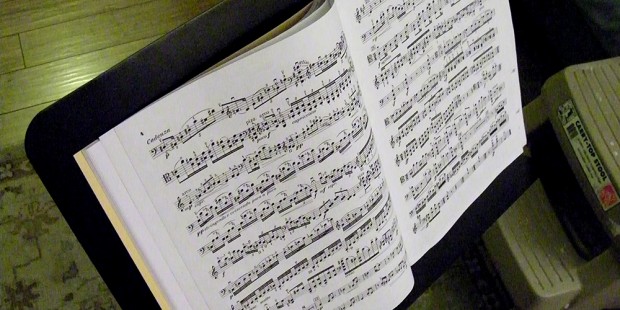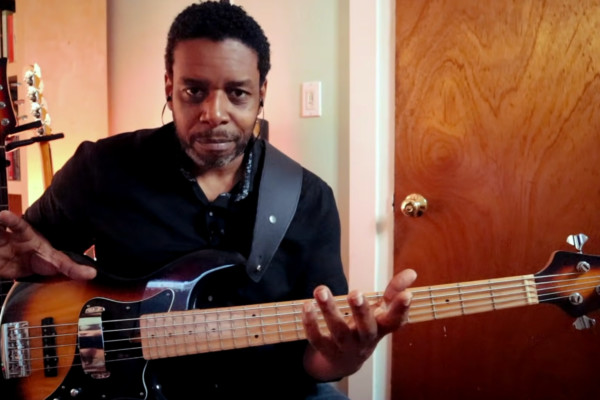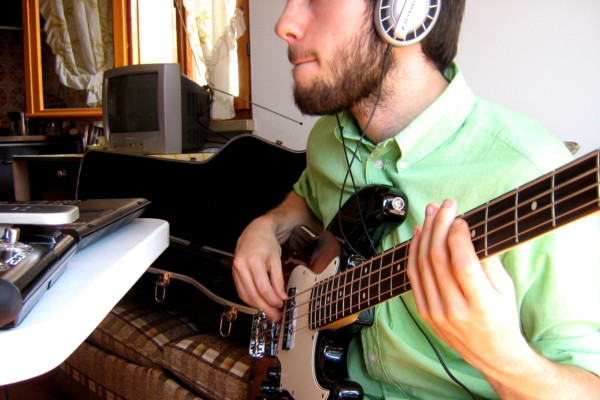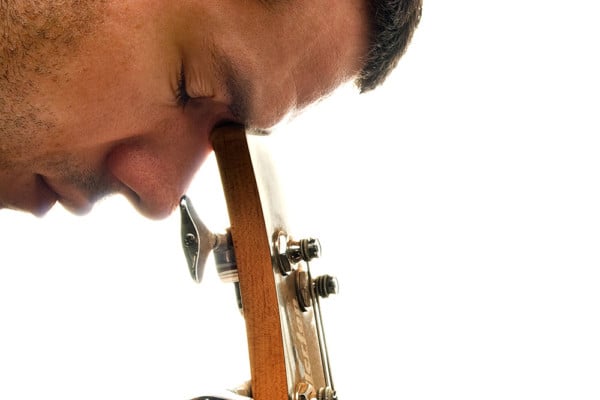How Much Should I Practice?

This is a question I get often from both serious students and amateurs alike. Since the answer depends on a person’s goals, and every person is unique, there is no single answer for everyone. However, I can make some general suggestions.
My suggestions will presuppose a few things:
You practice on a regular basis
- Daily, 6-7 days a week. This is perhaps the most important element.
- If you do nothing more than practice everyday, you will see some success.
- Did I mention you should do it daily?
Your practice time is well spent
- You know exactly what you are going to work on, and for how long.
- You avoid interruptions and disengaged playing, i.e. “going through the motions.”
What you practice is appropriate to your current skill level
- You are realistic about your current skill level and focus on work that is challenging, but not far above (or below) your current skill level.
We do not classify ensemble rehearsals, jamming, etc. as bass practice.
- Rehearsing with a band, performing, etc. is valuable, but aren’t included as practice here.
- Think of this sort of activity “playing.”
- Playing is important, but separate it from “practicing.”
My suggestions also assume that at each practice session you break things up, more or less, like so:
| Task | Time |
|---|---|
| Warm-up | Approximately 10 minutes |
| Review Material (Repertory and/or technique) | 40% of your remaining time (20 minutes for a 1 hour session) |
| New material (Repertory and/or technique) | 60% of your remaining time (30 minutes for a 1 hour session) |
Taking into account the above recommendations, I find that for most people:
One hour daily allows for most amateurs and hobbyists to see very satisfying progress.
Two hours daily allows for a more ambitious player to see progress.
Three hours daily is generally appropriate for most serious bassists, college performance majors, etc.
One might think that I would advise more daily practice hours for “the most serious.” There are certainly those who can benefit and thrive under a heavier load. However, this is often unnecessary to see significant progress. Before you consider practicing more than 3 hours a day, make sure you are being as efficient as possible within your 3 hour sessions:
- Is your practice session scheduled ahead of time?
- During the session: Is your mind wandering?
- Do you take needlessly long long breaks?
- Are you sometimes simply “going through the motions?”
Provided you are being as efficient as possible already:
- Practice more the 3 hours daily only if you are still able to be mentally attentive.
- Pay attention to your body. Use intelligence, awareness and discretion if you are considering this amount of practice daily. We don’t want injury.
Sometimes there can be benefit from practicing more than 3 hours a day. However, there is often a better use of your time. For example:
- You could fill that time by jamming with other musicians, preparing for performance by playing your own personal “greatest hits,” playing mock auditions, rehearsing with a band, etc.
- Perhaps studying some theory, listening to a new piece, studying a score, doing some ear training, learning to drum in 11/8, or visiting notreble.com would be a better use of your time.
So, how much should you practice? In my opinion, given all the presuppositions above:
- No less than 6 days a week.
- This is the most important factor determining your progress
- Even 1 hour per day can allow for substantial benefit.
- Provided you are practicing 6-7 days weekly, and are using your time efficiently, 3 hours daily is generally sufficient for significant progress.
How about you? What does your routine look like? Please share in the comments.
Dr. Donovan Stokes is on the faculty of Shenandoah University-Conservatory. Visit him online at www.donovanstokes.com and check out the Bass Coalition at www.basscoalition.com.




Sometimes i´m just sitting in front of the tv and going up and down the strings with my right hand like gggg dddd aaaa eeee aaaa dddd gggg and so on
I do the same thing with drumsticks on the table. 11/8, 9/8, 7/8, 5/8 are fun to exercise in.
Rest of my practice is theory, composition, improvisation(melody training), groove/rhythm and of course arpeggios. Í´m all selftaught, so I decide what to learn.Sometimes I improvise for 30 minutes and then just watch some youtube tutorials on soloing. Sometimes i´m standing in front of a sheet for another 30minutes, trying to figure out how to get a good approach from Dm7 to Gmaj7.
The most important thing is: You need a challenge. You need a goal, but(!) approach it poco a poco(step by step). Be patient and try to listen to your playing and think about it. There´s not just your Bass, or your fingers dexterity. You need your brain buddy :)
“Are you sometimes simply “going through the motions?” This so very important and very easy to get caught up in.
I’m a
Beginner and the 20 min old stuff and 30 min new stuff – practicing 1 hr a day – is the old stuff always going to be yesterday’s new stuff??
No, old material is stuff you have down. It will take more than a day to get a handle on a new concept. For older material, try going over technical exercises you’ve been playing with some ease for a while. Play old transcriptions you learned a while ago as well. That’s a very valuable exercise. Transcriptions in general are, IMHO, among the most important things you can spend your time on.
Transcriptions are basslines in tab? I’m a newbie
As far as I can see, a G chord will always be a G chord. Musical styles will wax and wane but
musical resources from centuries past will still have relevance. This was the premise behind
the teachings of the fictitious “Mr. Holland” (Richard Dreyfuss) in “Mr. Holland’s Opus”.
Believe it or not, there is a thread of relevance between a piece by Vivaldi and one by Ingwie
Malmsteen. Uh oh; did I just commit heresy?
I think its important to customize your practice routine to something personal that you hone over time. You could take parts from articles and books such as the Steve Vai 30-hour marathon practice set but then refine and adjust it so it becomes something you developed yourself — even better you like it. If you have fun practicing, results will manifest.
This is really very helpful info, but what I wonder mainly is, to play songs like YYZ, or similar, which has arround 140 bpm and sixteenth notes with string crossing, what is the best way to get strength and speed to able to play such songs clearly.
Dear Gurhan. I come from the classical and early music world, but some teachers gave me an amazing piece of advice to face fast 16th note passages. The idea is playing only 5 notes and come back from the 5th to the 1st several times. Then from the second to the sixth note. then 3rd to 7th. It is a bit weird and you actually play something quite different than the original stuff. But believe me, after a while, playing what is in the score becomes something much easier.
Hi Martisanma, thanks a lot for advice, i will try it also.
Interesting
Thanks for the brillianr article! The enemy here is focusing in what we already know instead of going further to unknown places. As in other fields, I think a previous programmation is crucial. “Ok, this week I am going to practice II-V-I, Bach transcriptions, …whatever”. Planification and concrete goals. It’s so easy to find yourself wandering and playing mechanically….!
One to One and a half hours Seven days a week.
I would like to add the mental training here. Sometimes playing is not possible (injury, traveling, etc.) and that time can be really beneficial if exercises are done mentally. Sometimes even 90 % of the training can be done before playing the instrument at all. Naturally, nothing can replace instrumental training completely but still the mental side should not be underestimated or forgotten. It is a very good way of working that can open up new ideas and get you up from the rut.
According to the old stereotype, the all-American kid music student sits at the spinet piano while his buddies are outside bewailing the absence of their prize shortstop. As his
youthful fingers go through the paces of “Fur Elise”, he looks at his glove atop the piano
and yearns to be…, well, you get the picture. My parents were musicians and when they learned that I wanted to take up an instrument, they tried their best to make
it a win/win situation. Mom took time from her busy schedule as a Spanish language instructor to teach me how to read music and Dad bought me a used Hagstrom guitar from a pawn shop. I could still enjoy other activities as long as I respected a “core time frame” for practice. Kids are known for their short attention spans, and this certainly varies
from child to child. I learned focus and commitment in that “core” and it hasn’t let me down in
nearly 40 years. Nowadays I have more “grownup” distractions, but as long as I can respect the “core”, to practice with no TV, iPad downloads, radios or arguing kids, I can learn something. Your core might be measured in hours whereas another person’s might be measured in less. If you already have an instructor, you have someone to keep the pace. Right now private tutoring is out of the question for me financially. I decide to review theory during one session and during another I’ll actually plug in the bass and put theory into practice. I’m committed to this and try not to rush anything. Find your niche of practice time and stay with it. Good luck.
In the book Outliers, Malcolm Gladwell states that it takes about 10 000 hours of practice to become an over night success in any field. It’s definitely a tangible goal for any musician who wants to instantly be able to add to their musical vocabulary.
Good advice, but between work, sleep and family life, every day is a tough goal for an amateur player. I feel it is important to set goals and work to reach them. And if you’re in a band, sometimes the band needs to come first. Leearning new songs is also progress. The most important thing is to have fun reaching for those goals. Feeling the fun of improvement is a great motivation and makes practice easier. :-)
I used to get up really early, so I could practice 1 to 1,5 hour before the day started.
Question is whether that meant you had to go to bed earlier…. I usually practice in the evening/early night.